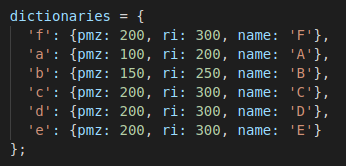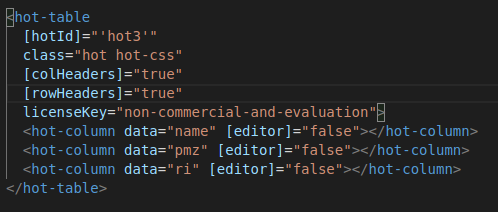Thanks for your response, @aleksandra_budnik, that’s very good to know that I can reference the data using a dot operator if needed.
However, is it possible to get a result that looks like this:
from the dictionary data as before:
dictionaries = {
‘f’: {pmz: 200, ri: 300, name: ‘F’},
‘a’: {pmz: 100, ri: 200, name: ‘A’},
‘b’: {pmz: 150, ri: 250, name: ‘B’},
‘c’: {pmz: 200, ri: 300, name: ‘C’},
‘d’: {pmz: 200, ri: 300, name: ‘D’},
‘e’: {pmz: 200, ri: 300, name: ‘E’}
};
In this example as in the screenshot above, the keys for each entry don’t matter here; ‘f’, ‘a’, and ‘b’ could be ‘x’, ‘y’, and ‘z’, etc.
I know I could push the data into a new array and display that in my table, like so:
this.instance = this.registerer.getInstance(‘hot’);
let arr = ;
for (let key in this.dictionaries) {
arr.push(this.dictionaries[key]);
}
this.instance.loadData(arr);
But I was wondering if I didn’t have to do this step of cycling through the data and making a new object, in order to save time. I’ll be downloading this data from an API, and the length of the dictionary can vary and be very large.
Thanks.



